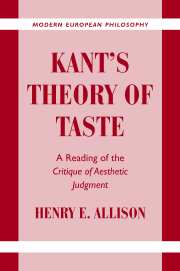Book contents
- Frontmatter
- Contents
- Acknowledgments
- Note on Sources and Key to Abbreviations and Translations
- Introduction
- PART I KANT'S CONCEPTION OF REFLECTIVE JUDGMENT
- PART II THE QUID FACTI AND THE QUID JURIS IN THE DOMAIN OF TASTE
- 3 The Analytic of the Beautiful and the Quid Facti: An Overview
- 4 The Disinterestedness of the Pure Judgment of Taste
- 5 Subjective Universality, the Universal Voice, and the Harmony of the Faculties
- 6 Beauty, Purposiveness, and Form
- 7 The Modality of Taste and the Sensus Communis
- 8 The Deduction of Pure Judgments of Taste
- PART III THE MORAL AND SYSTEMATIC SIGNIFICANCE OF TASTE
- PART IV PARERGA TO THE THEORY OF TASTE
- Notes
- Bibliography
- Index
3 - The Analytic of the Beautiful and the Quid Facti: An Overview
Published online by Cambridge University Press: 18 January 2010
- Frontmatter
- Contents
- Acknowledgments
- Note on Sources and Key to Abbreviations and Translations
- Introduction
- PART I KANT'S CONCEPTION OF REFLECTIVE JUDGMENT
- PART II THE QUID FACTI AND THE QUID JURIS IN THE DOMAIN OF TASTE
- 3 The Analytic of the Beautiful and the Quid Facti: An Overview
- 4 The Disinterestedness of the Pure Judgment of Taste
- 5 Subjective Universality, the Universal Voice, and the Harmony of the Faculties
- 6 Beauty, Purposiveness, and Form
- 7 The Modality of Taste and the Sensus Communis
- 8 The Deduction of Pure Judgments of Taste
- PART III THE MORAL AND SYSTEMATIC SIGNIFICANCE OF TASTE
- PART IV PARERGA TO THE THEORY OF TASTE
- Notes
- Bibliography
- Index
Summary
This part of the study is concerned with Kant's analysis of the nature and validity of judgments of taste, as treated in the Analytic of the Beautiful and the Deduction of Pure Aesthetic Judgments. Its organizing principle is that the distinction between the quid facti and the quid juris, which, as Dieter Henrich has shown, Kant took over from the so-called Deduktion-schriften, which were still widely used in his time to adjudicate various legal claims, is applicable to the Critique of Judgment as well as to the other Critiques. More specifically, the claim is that the quid facti in the domain of taste concerns the question of whether a given judgment of taste is pure, while the quid juris is whether a judgment that meets the conditions of purity can make a rightful demand on the agreement of others. The latter question is obviously the concern of the Deduction; but I am also suggesting that the Analytic of the Beautiful deals with the former, by specifying the conditions that must be met by any judgment that purports to be pure.
The present chapter is intended as an introduction to this part as a whole, but particularly to the next four chapters, which deal respectively with the four “moments” of the Analytic of the Beautiful. It is divided into five parts.
Information
- Type
- Chapter
- Information
- Kant's Theory of TasteA Reading of the Critique of Aesthetic Judgment, pp. 67 - 84Publisher: Cambridge University PressPrint publication year: 2001
